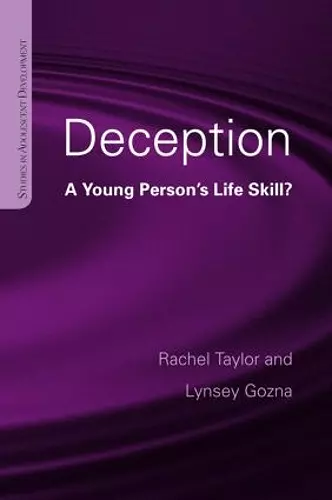Deception
A Young Person's Life Skill?
Rachel Taylor author Lynsey Gozna author
Format:Hardback
Publisher:Taylor & Francis Ltd
Published:26th Nov '10
Currently unavailable, and unfortunately no date known when it will be back

This book considers the role of deception during adolescence, and explores the factors which underpin adolescents’ choice to deceive, whether these deceptions will be successful, and the ways in which such lies could be detected. While deception is considered to be antisocial or even pathological in some circumstances, the central argument of this book is that lying can be a skilled behaviour which is necessary to allow adolescents to establish autonomy.
Deception builds on the recent influential developmental challenge model (Hendry and Kloep, 2002, 2009), exploring how it can provide a useful explanatory framework for the development of the skill of deception in adolescence. Interpersonal and forensic settings for deceptive behaviour are referred to, and illustrated with reference to both published research and new data obtained from a variety of different interviews and focus groups with young people. It also considers how the choice to communicate truthfully is as important as the choice to communicate deceptively in illuminating the developmental process. It concludes with a discussion of how adolescents’ deceptions could be detected and presents a range of strategies to maximize the effectiveness of interpersonal interactions with suspected deceivers.
By considering everyday, forensic and clinical deception situations, this book is ideal for academic researchers, practitioners working with children and young people, as well as parents. The observations, interviews and focus groups provide a unique insight into the factors influencing young people’s communication choices, and integrate research from developmental, social and forensic psychology.
"This book accessibly describes the theory and evidence related to strategic deception and its detection in adolescence. The developmental issues covered give it cross-disciplinary appeal, and pointers on deception detection are invaluable to practitioners in forensic and educational psychology, and insightful for students of psychology and the behavioural sciences." - Bere Mahoney, Senior Lecturer in Psychological Sciences, University of Worcester UK
"This groundbreaking book positions deceptive communication as a developmental life skill. Moving beyond simple understandings and utilizing a systems approach, the authors consider deception as embedded within social contexts. It will be required reading for practitioners, researchers and students to understand adolescent deceptive behaviour in both clinical and non-clinical contexts." - Angie Williams, Senior Lecturer, Centre for Language and Communication Research, Cardiff University UK
"This book accessibly describes the theory and evidence related to strategic deception and its detection in adolescence. The developmental issues covered give it cross-disciplinary appeal, and pointers on deception detection are invaluable to practitioners in forensic and educational psychology, and insightful for students of psychology and the behavioural sciences." - Bere Mahoney, Senior Lecturer in Psychological Sciences, University of Worcester UK
"This groundbreaking book positions deceptive communication as a developmental life skill. Moving beyond simple understandings and utilizing a systems approach, the authors consider deception as embedded within social contexts. It will be required reading for practitioners, researchers and students to understand adolescent deceptive behaviour in both clinical and non-clinical contexts." - Angie Williams, Centre for Language and Communication Research, Cardiff University UK
ISBN: 9781841698762
Dimensions: unknown
Weight: 520g
192 pages